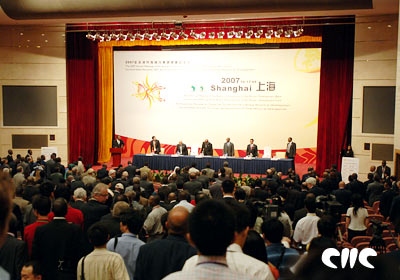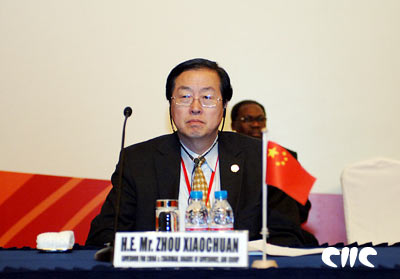Speaking at the ministerial round table of the African
Development Bank in Shanghai on Tuesday, Zhou Xiaochuan, governor of People's Bank of
China, outlined that a shift of comparative advantages, new trends
in saving and capital flow and the deepening of bilateral financial
cooperation would jointly provide new momentum in strengthening
Asia-Africa trade and economic cooperation.


The attendees at the round table, themed as Africa and
Asia: Partners in Development, exchanged views about the
roles taken up by Asia and the continent's two emerging powers,
China and India, in stimulating African development.
Holding the meeting in Shanghai, said Zhou, presented a unique
platform from which to scrutinize the relationship between Asia and
Africa.
Asia-Africa trade and economic cooperation offered great
potential for future development due to highly complementary
economies, which stand as the two fastest-growing continental
economies in the world. The last decade has provided continuous
reminders of the mutually-beneficial advancements in the
Asia-Africa partnership, and strengthening it further will help to
take further strides in poverty reduction and development, Zhou
emphasized.
Zhou specified that three principal new factors would be the
driving force for future bilateral trade and economic
cooperation.
The first factor relates to the shifting of comparative
advantages. Conventional theory dictates that developing countries
produce primary products due to rich natural resources and low
labor costs while developed countries corner the high-end side of
the market. However, these advantages are slowly shifting due to
more graded labor cost and infrastructural investment variations.
Increasingly, emerging Asian countries have generated capital flow
with certain nations electing to invest in Africa. Although the
amount involved may not be very great, the trend marks an important
step as world players move to secure their own comparative
advantages. New opportunities are coming to the fore as private
sector investments and merger and acquisitions take on more active
roles, and these opportunities must be seized to ensure the dynamic
flow of Asia-Africa economic cooperation, emphasized Zhou.
Secondly, we must look at new trends of saving and capital flow
where again old ways are being supplanted by new methods.
Previously, habitual capital flow from developed industrial
countries to developing countries through investment, loans and
financial assistance. However, following the Asian Financial Crisis
at the turn of the century, saving rates rocketed across Asia
creating avenues for outward investment. Oil and natural gas
exports have created global capital while pension reforms spreading
across the world have also diversified global capital flow
channels. These have enabled more Asian countries to become
investors themselves through channels such as pensions and
investment funds, and through these, to extend the avenues of
progress for Asia and Africa's economies.
Thirdly, Zhou addressed the need for more financial cooperation
between Asia and Africa to enhance cooperation. Deepening financial
market reforms and ensuring better-quality services among financial
institutions will enable optimum mobilization of savings as well as
securing the uses of capital. Such security will be beneficial to
developing countries in avoiding or at least dampening financial
risks.
Zhou announced that China would boost cooperation with African
nations in the following areas: financial reform, fiscal-ecological
environment improvement and enhancement of macro-financial control.
It would also encourage active investment in Africa from within its
own business community, focusing on small, medium-sized and private
enterprises to boost globalization and the shift of comparative
advantages.
Meanwhile, Chinese financial institutions will actively engage
in African infrastructural construction, coming as a pillar of
support to help boost local development. A welcome has also been
extended to African partners seeking to boost their Chinese
presence, by opening liaison offices or branches while new avenues
of dialogue are being sought to track and promote chances for
universal financial cooperation between the two continents.
In closing, Zhou added that China would improve its partnership
with African Development Bank and other sub-regional banks in
diverse manners, including increasing donations to the African
Development Fund, the establishment of bilateral technological
cooperation fund and more efforts given over to poverty-reduction
activities.
(China.org.cn by staff reporter Li Shen in Shanghai, May 16,
2007)